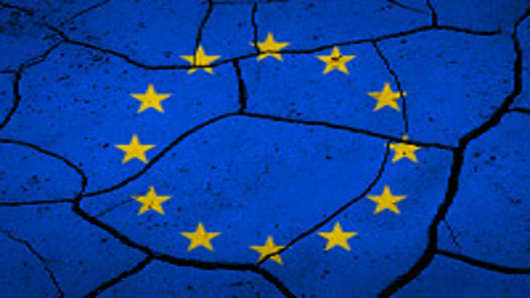The European debt crisis has revealed that the euro zone is in a final phase and cannot be saved as a single entity, David Murrin, chief investment officer at Emergent Asset Management, told CNBC.
"Europe is in a terminal phase of its life. There is no way I can see a glomeration being a successful way of smaller entities into bigger entities without growth. There will be fractures. (There is) no way Europe is ever going to hold it together," Murrin said.
He added that the management of the crisis by European leaders had now become desperate.
"It's fascinating watching the European politicians desperately trying to hold the system together, which is bankrupt financially and in terms of its mechanisms for encouraging growth economies that move forward. Now they have to make pacts with each other, their desperation is very apparent," he said.
However, he said that Germany—which is in an incredibly strong position now—will never let anything lower its standard of living, but the "end phase" for Europe had already begun.
"We're right in the end phase right now. The general appreciation of these constant political meetings which produce absolutely nothing is that there is no substance behind the proposals with European leaders," Murrin said.
He said no amount of money from the ECB would tackle the fundamental paradigm that Europe cannot grow.
"If you took most financial people aside, if they're outside Europe they'd say it isn't going to work. The ramifications of that haven't hit home yet," he said.
European Union leaders will meet for their latest summit on Friday December 9. German chancellor Angela Merkel and French President Nicolas Sarkozy held the first of their pre-summit meetings on Monday.
Their proposals from the initial meeting included a possible treaty change for either the 17 euro zone nations or all 27 EU states leading to greater fiscal union and new tighter budget rules.
Not everyone agrees that Europe's crisis is intractable in the long term, but Murrin isn't alone in his in pessimism toward the euro zone.
Ian Bremmer, president at Eurasia group, told CNBC that any fiscal union would be acrimonious for the region if a two-tier Europe prevailed.
"If the markets want a defined outcome in the coming days, weeks and months, they're not going to get it. If the peripheral states are going to continue to be in some sub standard, second class situation, how is it that you're going to maintain social stability and cohesion? Longer term, if you want resolution in the euro zone you're going to have political and social instability unless you talk about transfer payments," Bremmer said.
Simon Smith, chief economist at FxPro, was equally pessimistic about the prospects of a successful resolution to the debt crisis. Smith argued that the plan put forward by Merkel and Sarkozy was too limp to decisively deal with the issue.
"What was announced was a sort of measure of strong surveillance that didn't work for the eight years of the euro so why ever do they think it will work now? It underlines that they did not really understand the crisis and I am not confident that they will understand the required solution," Smith told CNBC.


